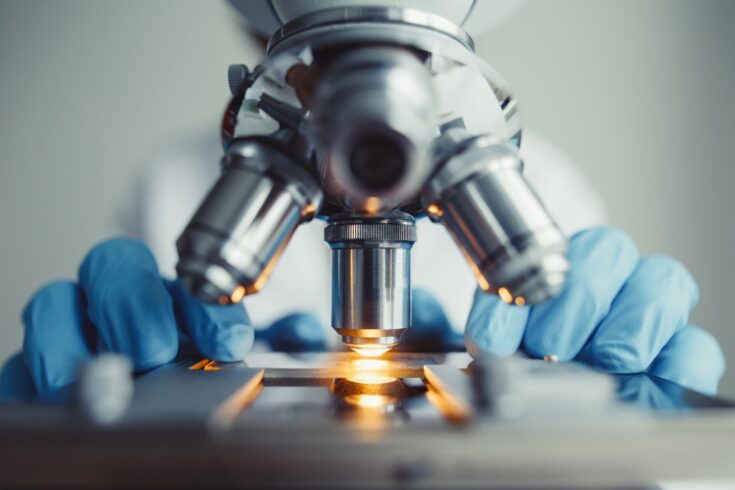New Biotechnology and Biological Sciences Research Council (BBSRC) funding enables bioscientists to test and validate their business ideas in the UK marketplace.
11 promising bioscience projects led by UK researchers and PhD students have been backed in the inaugural round of BBSRC’s Innovation-to-Commercialisation of University Research (ICURe) Lean Launch programme.
The ICURe programme is a collaboration between:
- BBSRC
- Innovate UK
- North by North West.
Rapidly testing market feasibility
The programme helps participants rapidly test the market feasibility of their bioscience innovations by putting them through a rigorous 10-week online customer discovery programme.
The successful projects, which range from modular printing of contact lenses, to improving animal welfare and scaling up production of enzymes, each receive:
- £2,500 market discovery funding
- £1,200 business advisor funding.
It also supports and encourages participants to step out of their comfort zone by putting themselves in the shoes of potential customers and discussing their ideas from an entirely new perspective.
Expert guidance and advice
At the end of the programme, participants present their findings to a commercialisation and innovation panel in return for expert guidance and advice on the most suitable path to commercialisation.
Expert panellists will offer a range of options and advice to support participants in taking their next steps, some of which might include:
- conducting further research and, or, technical development
- focusing on product licensing
- evolving the product, service or idea by spinning out a new company.
Bringing bioscience closer to market
Nick Bassett, BBSRC’s Associate Director for Innovation, said:
We’re thrilled to announce the winners of the inaugural round of the BBSRC ICURe pilot programme with a truly diverse mix of exciting bioscience innovation projects.
From health and wellbeing, to agriculture and food, to materials and manufacturing, these projects represent the full breadth and scale of BBSRC’s bioscience portfolio.
Shaping emerging technologies to meet market demand is essential for success and ICURe is a fantastic way to bring vital research to life through the eyes of potential customers.
BBSRC is proud to be working with its partners at Innovate UK and North by North West to bring this dynamic programme to life.
Three further ICURe rounds
With the first round of ICURe Lean Launch now well underway, BBSRC has commenced plans to launch a further three rounds of the programme throughout the remainder of 2022.
Further information
Funded projects
The ICURe Lean Launch projects:
Extreme throughput enzyme evolution technology for the bioeconomy
High throughput technology for discovery, evolution and improvement of genes and proteins to improve performance, reduce costs and drive sustainable development across the bioeconomy.
Led by Gareth Little, University of Nottingham.
Air-seq: an unbiased technology for detection of any biological agent
Near real time identification of airborne pathogens using sequencing and bespoke bioinformatic analysis.
Led by Darren Chooneea, Earlham Institute and Natural History Museum.
DEC Lens: A contact lens that delivers fast and effective treatments directly to the eye
Using adaptive modular printing technology to provide safe precision treatment for chronic eye disease.
Led by Chak Hin Tam, University of East Anglia.
Cellexcellent water-resistant biocomposites
Enhancing biocomposite water resistance with sustainably sourced alternatives.
Led by G Richard Stephenson, University of East Anglia.
MVPea
Providing consumers with a healthy starch alternative with our low glycemic index, naturally gluten and allergen free pea varieties.
Led by Diego Durantini, John Innes Centre.
Freezymes: for enzymes that like to fold in the cold
Optimising large-scale enzyme production for maximum quality, value, and sustainability.
Led by Matt Edmundson, The University of Edinburgh.
Animal-centric approach to measuring light intensity
Standardising lab and farm housing conditions for improved animal welfare, reduced animal use and greater consistency across agricultural productivity research.
Led by Altug Didikoglu, The University of Manchester.
Sight for sore eyes
Therapeutic lipids for the treatment of macular degeneration.
Led by Johnathan Napier, Rothamsted Research.
Virilitas
Improving male fertility diagnostics and interventions.
Led by Daniel Marcu, University of East Anglia.
Chicken antibodies
Leveraging 300 million years of divergence for drug discovery.
Led by Joshua Sealy, The Pirbright Institute.
Predicting perfect performance
Optimising bacterial bioprocessing for improved yield, cost efficiency and the end of trial and error.
Led by Mark Webber, Quadram Institute Bioscience.
Programme partners
ICURe programme partners:
- BBSRC
- Helix Hub
- Innovate UK
- Lancaster University
- Queen’s University Belfast
- Ulster University
- The University of Edinburgh
- University of Leeds
- University of Liverpool
- The University of Manchester
- The University of Sheffield.
Top image: Credit: Kkolosov, iStock, Getty Images Plus via Getty Images

